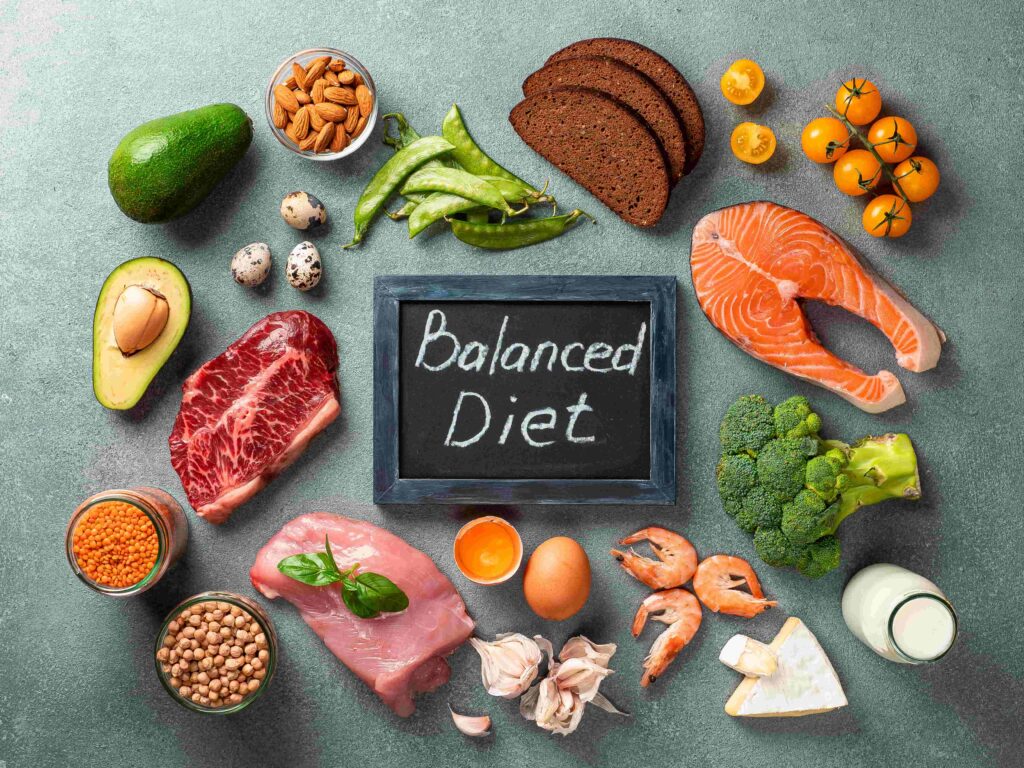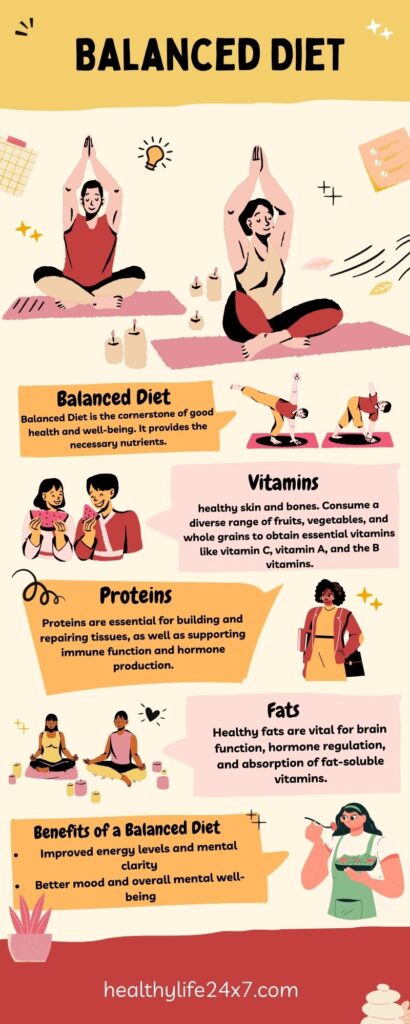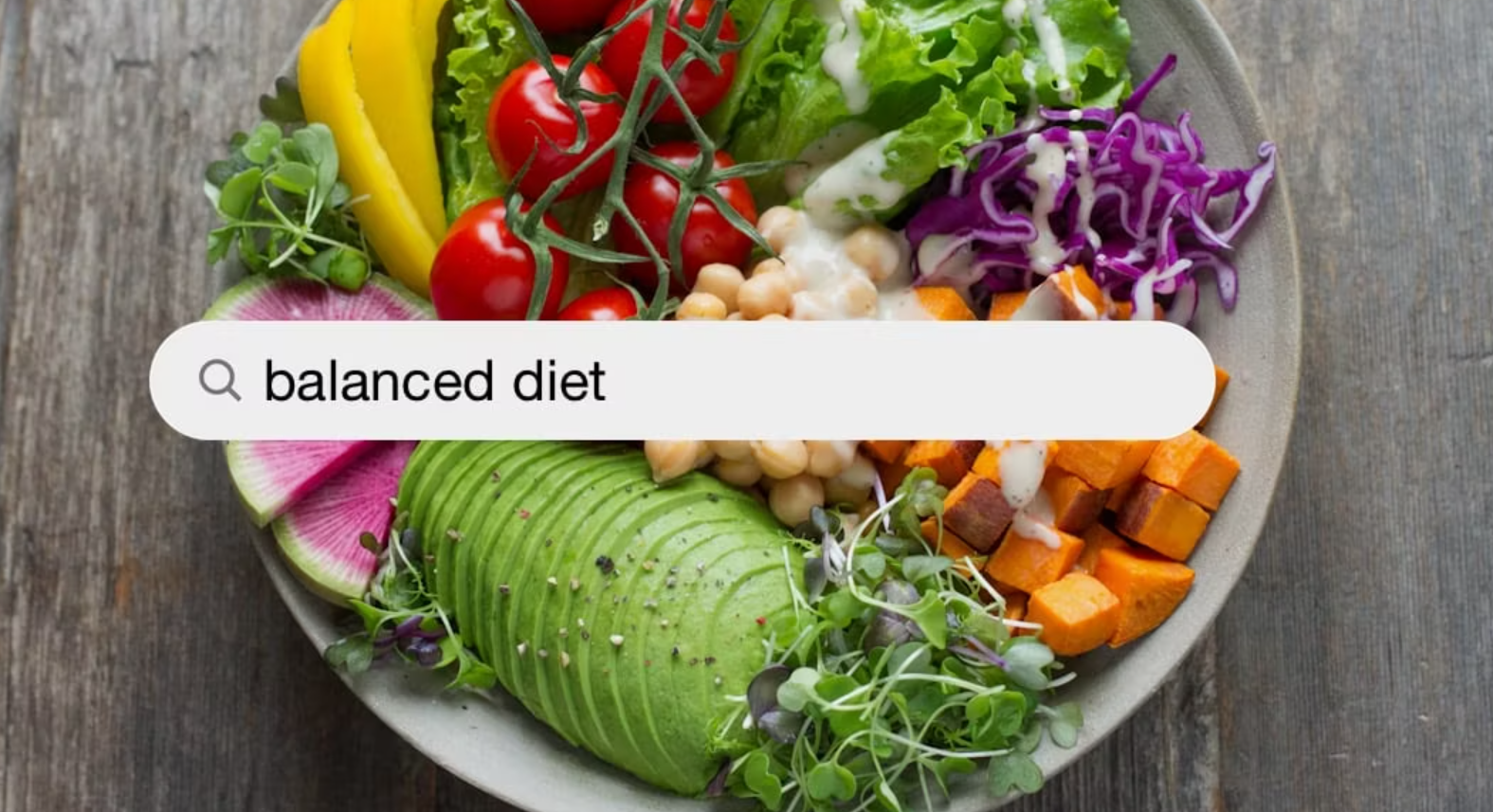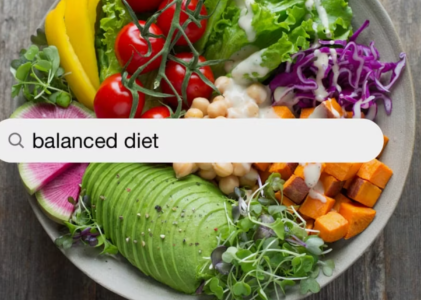Balanced Diet
- Balanced Diet is the cornerstone of good health and well-being. It provides the necessary nutrients in the right proportions to fuel our bodies, support growth, repair tissues, and maintain overall health. Achieving a balanced diet involves consuming a variety of foods from different food groups in appropriate amounts. Let’s delve deeper into what constitutes a balanced diet and why it’s crucial for our health.
Macronutrients: The Building Blocks
Carbohydrates
- Carbohydrates are the primary source of energy for the body. They are found in foods such as grains, fruits, vegetables, and legumes. Pot for complex carbohydrates like whole grains, which provide sustained energy and fibber for digestive health.
Proteins
- Proteins are essential for building and repairing tissues, as well as supporting immune function and hormone production. Include lean sources of protein such as poultry, fish, tofu, legumes, and nuts in your diet.
Fats
- Healthy fats are vital for brain function, hormone regulation, and absorption of fat-soluble vitamins. Choose sources of unsaturated fats like avocados, olive oil, nuts, and fatty fish while limiting saturated and trans fats found in fried foods and processed snacks.
Micronutrients: Essential for Health
Vitamins
- Vitamins play various roles in the body, from supporting vision and immune function to promoting healthy skin and bones. Consume a diverse range of fruits, vegetables, and whole grains to obtain essential vitamins like vitamin C, vitamin A, and the B vitamins.
Minerals
- Minerals are essential for building strong bones, transmitting nerve impulses, and maintaining fluid balance. Incorporate foods rich in minerals such as calcium, potassium, magnesium, and iron into your diet through sources like dairy products, leafy greens, nuts, and seeds.
Water: The Elixir of Life
- Water is vital for every function in the body, from regulating temperature to transporting nutrients and flushing out waste products. Aim to drink at least eight glasses of water per day, and adjust your intake based on activity level, climate, and individual needs.
Balanced Diet and Weight Management
- Maintaining a balanced diet is key to achieving and maintaining a healthy weight. It helps regulate appetite, prevent overeating, and promote fat loss while preserving lean muscle mass.

Balanced Diet for Different Age Groups
Children and Adolescents
- Children and adolescents have unique nutritional needs due to growth and development. A balanced diet rich in nutrient-dense foods is crucial for supporting optimal growth, cognitive function, and overall health.
Elderly
- Older adults may have different nutritional requirements due to age-related changes in metabolism and nutrient absorption. A balanced diet can help prevent nutrient deficiencies, support bone health, and enhance quality of life in later years.
Meal Planning and Portion Control
Importance of Meal Planning
- Meal planning helps ensure that you have nutritious meals and snacks readily available, reducing the temptation to opt for convenient but unhealthy options. Plan meals ahead of time, make a grocery list, and prep ingredients to save time during busy weekdays.

Tips for Portion Control
- Practice mindful eating by paying attention to hunger and fullness cues, eating slowly, and savouring each bite. Use smaller plates and bowls, measure serving sizes, and avoid eating directly from packages to prevent overeating.
Benefits of a Balanced Diet
A balanced diet offers numerous health benefits beyond weight management
- Improved energy levels and mental clarity
- Enhanced immune function and reduced risk of infections
- Better mood and overall mental well-being
- Lower risk of chronic diseases such as heart disease, diabetes, and stroke

Common Misconceptions about Balanced Diets
Myth of Exclusion Diets
- Contrary to popular belief, a balanced diet does not require eliminating entire food groups or following restrictive diets. Instead, focus on incorporating a variety of foods from all food groups in moderation.
Myth of Expensive Eating
- Eating a balanced diet doesn’t have to break the bank. Affordable options like grains, legumes, fruits, and vegetables can provide essential nutrients without costing a fortune. Shop smart, buy seasonal produce, and consider frozen or canned options as budget-friendly alternatives.
Practical Tips for Achieving a Balanced Diet
Reading Food Labels
- Learn to read food labels to identify nutrient-rich foods and avoid products high in added sugars, sodium, and unhealthy fats. Pay attention to serving sizes, ingredients, and nutrient content per serving to make informed choices.
Incorporating Variety
- Experiment with different foods and recipes to keep meals interesting and enjoyable. Aim for a colourful plate filled with a variety of fruits, vegetables, whole grains, lean proteins, and healthy fats to ensure a well-rounded diet.
Moderation vs. Deprivation
- Practice moderation rather than deprivation when it comes to your diet. Allow yourself to enjoy occasional treats or indulgences while focusing on overall balance and portion control. Remember that no single food or meal will make or break your diet.



Millions of Free Traffic with AI Tools – https://ext-opp.com/AIVault
Pingback: Kidney Infections HEALTHYLIFE 13 April 2024
I want to show you one exclusive software called (BTC PROFIT SEARCH AND MINING PHRASES), which can make you a rich man, and maybe even a billionaire!
This program searches for Bitcoin wallets with a balance, and tries to find a secret phrase for them to get full access to the lost wallet!
Run the program and wait, and in order to increase your chances, install the program on all computers available to you, at work, with your friends, with your relatives, you can also ask your classmates to use the program, so your chances will increase tenfold!
Remember the more computers you use, the higher your chances of getting the treasure!
Thank me by donating if you have the opportunity.
Free Download:
https://t.me/btc_profit_search
Hey people!!!!!
Good mood and good luck to everyone!!!!!
oo yasssss.